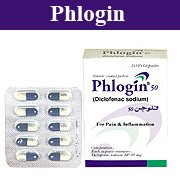
Pharmacokinetics: Phlogin 50 & Phlogin SR 100 Capsules
Phlogin (Diclofenac Sodium) is absorbed quickly from gastro-intestinal tract. Peak plasma concentration occurs in about 2 hours, plasma half-life is attained within 1-4 hours after ingestion. Phlogin (Diclofenac Sodium) does not accumulate in the body. After metabolism 2/3rd is excreted via kidney and 1/3rd via faeces.
Phlogin Injection
With a dose of 75 mg IM, the peak plasma concentration is attained within 10-22 minutes. Protein binding is 99.7%. Plasma half-life of Phlogin Injection is 1-2 hours. The active substance is excreted via the kidneys in the form of metabolites. Less than 1% excreted as un-changed drug in the urine. The plasma concentration does not rise even in the presence of severe renal failure.
Indications
Phlogin is indicated in all painful and inflammatory conditions including;
- All inflammatory and degenerative forms of rheumatism e.g. Rheumatoid arthritis, Ankylosing spondylitis, Osteoarthritis
- Intervertebral disc syndrome (lumbago, sciatica)
- Non-articular rheumatism e.g. bursitis, tendonitis, myositis etc.
- Acute attacks of gout
- Renal colic
- Dysmenorrhea
- Dental pain
- Post-operative and post-traumatic pain, inflammation and swelling
Phlogin (Diclofenac Sodium) Contraindications
Phlogin (Diclofenac Sodium) may not be used in patients with hypersensitivity to the active ingredient, peptic ulcer, porphyria and disturbances of hematopoiesis. Phlogin is also contra-indicated in asthmatic patients in whom attacks of asthma, urticaria or acute rhinitis are known to be precipitated by acetylsalicylic acid or by any other agent with prostaglandin inhibiting activity.
Cautions
Phlogin should be given with caution in patients with G.I.T. disorders, severe hepatic or renal damage. As with other drugs frequent blood count should be performed in patients on long term therapy. As with NSAIDs the patients who have just had heart surgery should not take Phlogin.
The problem is that the doctors generally do not enquire whether or not patient is sensitive to any particular drug or its constituent.
As a digression an example is Fasygin or Flagyl family in which many a patients land up in hospital. It has a severe reaction. But doctors and the dentists in particular happily prescribe it without even advising any caution should any reaction comes about?